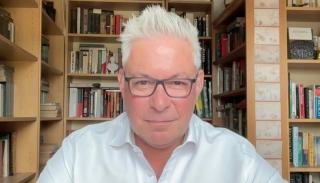
Breadcrumbs navigation
In discussion: Tim Edmunds
We recently announced the election of new members of our Executive Committee. We hope this interview series, one with each new trustee, will help you get to know them a little better. This time it's the turn of Tim Edmunds who is based at the University of Bristol.
Tell us a bit about yourself and where you are from
This is kind of a tricky question as I’ve moved around a lot over years! I was born in Southampton but spent my formative years in small village just outside Exeter in Devon. I did my A-Levels in Milton Keynes, then a Peace Studies BA in Bradford and my PhD in the History Department at Sheffield. I was very nearly the first person in my family to go to university, but my mum beat me to it by a year, embarking on a psychology degree at Warwick as a mature student the year before me. My first academic job was at Nottingham, then the Defence Studies Department of KCL in Shrivenham, before finally moving to Bristol in 2003. In between those times I lived in Hull, where I built caravans for a year, and in Almaty, Kazakhstan, where I did my PhD fieldwork in 1996. I left a bit of my heart in almost all those places though I guess Devon (and more generally the southwest of England) feels most like home to me.
Why did you want to be a BISA trustee and what do you hope to achieve during your term?
BISA has given me many opportunities over the course of my career, and I felt it was time to give something back. I already had some involvement with the work of the BISA Exec during my time as Editor-in-Chief of the EJIS and was impressed by the sense of commitment, collegiality and responsibility to the discipline that characterised the work of the trustees. At a difficult time for the university sector, I’d like to help the Association promote IR in the UK and beyond, to support the work of the journal editorial teams, and above all to maintain BISA as a globally important community of scholarship at heart of discipline worldwide.
What is your area of research and how did you get into it? What are you currently working on?
My research addresses issues of maritime security and ocean governance. This includes challenges like piracy, illegal fishing, and grey zone warfare at sea, but also marine environmental protection and blue justice. I first became interested in maritime security around ten years ago when I met my long-term collaborator, Christian Bueger, now at the University of Copenhagen, at a conference in Belgrade. I was working on security sector reform, he on counterpiracy. We discussed how little work there was (at that time) on maritime security sector reform. That led to a successful research grant bid, and the rest is history. Currently, I’m interested in critical maritime infrastructure protection, especially of offshore renewables like windfarms, and the intersection between maritime security and marine environmental protection.
You were the inaugural editor of the BISA journal European Journal of International Security (EJIS). What did that involve?
Well, for a start, it involved a huge commitment of time and emotional energy! Establishing a journal from scratch is hard work, especially given the ambitions we and BISA had for the journal. We started out with a cast iron commitment to publishing quality, field-advancing research. That meant persuading colleagues to submit their best papers to us, even though we were something of an unknown quantity at the time. We were helped by our association with BISA and CUP and a superb editorial team, to whom I am forever grateful. We also spent a huge amount of time working with authors to make their papers as good as they could be. Even so, the first couple of years were, for me at least, characterised by sleepless nights and relentless nervous tension over whether we’d have enough strong papers for the next issue. I’m over the moon to see how far the EJIS has come since then, and delighted by the news that it has achieved a 2.5 impact factor and become a Q1 journal in IR. The new editorial team under Andrew Mumford is also fantastic, and I’m very much looking forward to working with them in future.
Do you have any advice for PhD students who are about to go on the job market?
Focus on making the most of your research in terms of potential publications. A good way to start is with a paper submission to a specialist journal in your sub-discipline, but also think about how you might tailor your work to a more generalist outlet such as the RIS or EJIS. Think about how your thesis might work as a book, and don’t be shy of sending proposals to publishers. If you can secure a book contract that’s a major CV boost. Take advice from mentors and more experienced colleagues. Run drafts past them if you can and act on their feedback. Try to get a range of teaching experience under your belt; most selection committees are looking for people who can teach in their specialist area, but also cover more general teaching too. Don’t neglect other kinds of job opportunities such as postdoc positions. These can be great bridging opportunities to more permanent positions. All that said, make sure you look after yourself. Completing a PhD is hard enough as it is, and the academic job market is very challenging right now. Remember, it’s a marathon not a sprint and the pressure to excel all the time can be overwhelming and even counterproductive. Pace yourself, take it steady and plan ahead.
Is there anything else we should know about you?
Outside of work I’m a keen cyclist and hill walker, tea drinker, beer aficionado, backgammon enthusiast, and player of video games. I have two cats, both of whom plot against me.